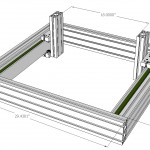Was browsing around and saw an article over on MIT Technology Review. These guys are using ethonol in a slightly different way rather than just burning it.
The researchers devised a system in which gasoline would be injected into the combustion chamber by conventional means. Ethanol would be stored in its own tank or compartment and would be introduced by a separate direct-injection system. The ethanol would have to be replenished only once every few months, roughly as often as the oil is changed. A vehicle that used this approach would operate around 25 percent more efficiently than a vehicle with a conventional engine.
Link to article: The Incredible Shrinking Engine This article is over a year old now.
Something more recent. The free piston engine. Same MIT Technology website, this time an old idea for the current age.
Free-piston engines aren’t new: they were invented in the 1920s. But the increased recent focus on hybrid cars has led a growing number of research groups and automakers to start research programs to develop the technology. Unlike in conventional engines, there is no mechanical connection between the piston and a crankshaft (hence the name free-piston). Since the design allows for improved combustion and less friction, the engines could be far more efficient in generating electricity than either conventional generators or newer fuel-cell technology.
Seems they have a working prototype, and are working through some issues, but this might be a pretty cool solution for long range hybrid cars, and airplanes.
Link: High Efficency Generators for Hybrids

